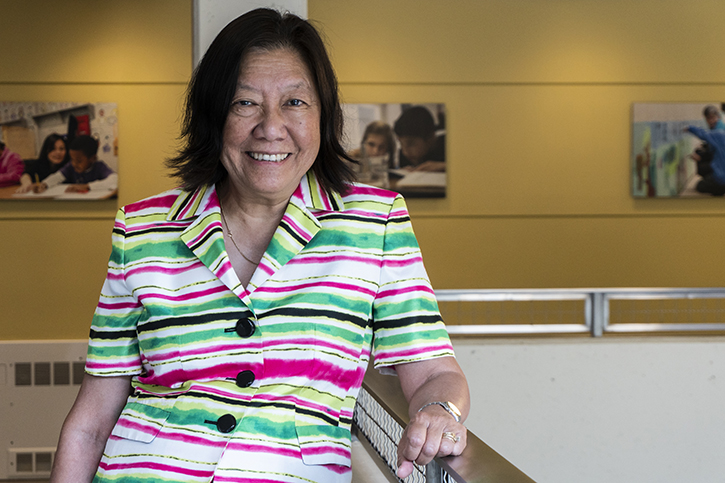
Shelley Wong begins a Fulbright Fellowship in August. Photo by Lathan Goumas.
For Shelley Wong, an associate professor of multilingual and multicultural education at George Mason University, music is an important tool in the teaching of languages.
“It’s a way to lose your inhibitions,” she said.
Music, or songs, to be more precise, are central to the proposal Wong used to win a Fulbright Fellowship, which will allow her to travel to the West Bank in Palestine, where she will teach grammar to students majoring in English and instructors at Birzeit University in Ramallah and also engage them in discussions about justice, peace and reconciliation.
Music affords students of all ages and language abilities a way to explore global awareness and cross barriers of racial, gender and class segregations and divisions, Wong said.
“I’m interested in ways we can look at things, deal with things: peace, justice on a classroom level, on a playground level,” she said. “How do we deal with bullying? How do we deal with acceptance of people who have different opinions, religions, no religion? Through songs and language, you can deal with a lot.”
Her yearlong fellowship begins in August.
Wong has visited Palestine before, in 2007, with then-Mason professor Ilham Nasser, who is from Nazareth.
“We interviewed teachers there and in Jerusalem and Ramallah,” Wong said. “We were able to meet with teachers who were so dedicated, who worked in refugee camps and had to go through all the checkpoints to even make it to school. It seems so dismal, yet teachers continue to do their work and do the best they can under very difficult circumstances.”
Wong said what makes her project unique is “the power of popular music to unite people around the world who have been previously been divided and isolated from each other.” She also cited numerous studies that indicate music helps the teaching of vocabulary, pronunciation and grammar through lessons accompanying the lyrics.
Wong said her songbook will be compiled by an international research team to address major grammatical challenges and to ensure a connection to justice, peace and reconciliation.
For example, Beyoncé’s “If I Were a Boy” will allow for a discussion about unreal conditionals, which Wong called “a troublesome grammar point.” It also could prompt discussions about gender stereotypes and violence against women, she said.
The Beatles’ “Blackbird” can be used to teach the past progressive tense. The lyrics, Wong said, can help students imagine different futures.
“Her work is groundbreaking,” said Mark Ginsberg, dean of the College of Education and Human Development. “I am confident her impact will be great and she will return with many new ideas for developing innovative best practices.”
“I’m convinced,” Wong said, “that music can change the world.”
